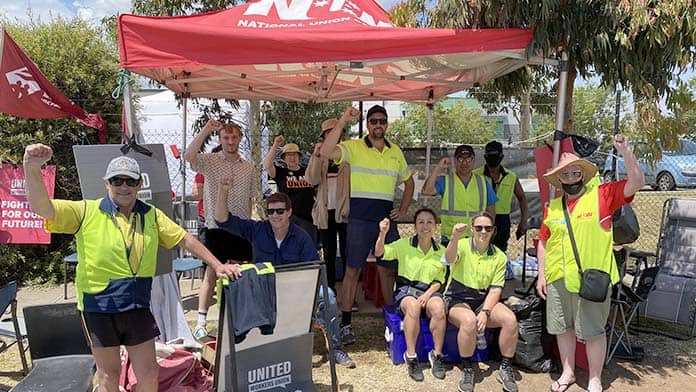Workers at Hanes’s warehouse in Melbourne have won some job security protections and a pay rise after a five day strike.
The hundreds-strong workforce at Truganina in Melbourne’s west won a guarantee that permanent workers will not have their jobs casualised, a pay rise, and a $2000 bonus, according to their union, the United Workers Union (UWU). Hanes runs the sole distribution centre in the state for brands including Bonds, Champion, and Sheridan sheets.
The company has been steadily increasing the rate of casualisation at the warehouse. Brayden, a permanent worker and union delegate, told Solidarity, “Slowly and surely our numbers are getting lower and lower to a point where eventually it will be all casuals and no full-time employment.”
“And we’ve got casuals that have worked here for up to eight years and have never been offered full-time employment,” he said.
“We want some job security [especially] for guys who have been working here that long.
Less than half the workforce is permanently employed and no new permanent staff have been hired since 2015, he said.
Daytime shifts of 150 workers include up to 130 full-time workers, but on night shift there are often only ten full-timers with the rest casuals. The casuals are employed through labour-hire agencies and are told if they don’t attend a shift, they will lose all chance of work.
The strike began with hard pickets that shut down the warehouse for two days. “Monday, Tuesday we were letting nothing in, nothing out”, Brayden said. But after the company threatened to take the union to Fair Work, it pulled off the pickets.
Instead, “we went to Melbourne, to the front of a few shops. We didn’t prevent anyone from entering, we just handed out a few flyers … [with] information on the products they were purchasing”.
While workers at Hanes didn’t get all that they were after, their strike forced the company to back down on efforts to attack their conditions. It is going to take strike action combined with effective picketing that shuts down work completely to win the fight for permanent jobs and a secure future.
By Daniel Bickle-Lazarow and Tom Fiebig




